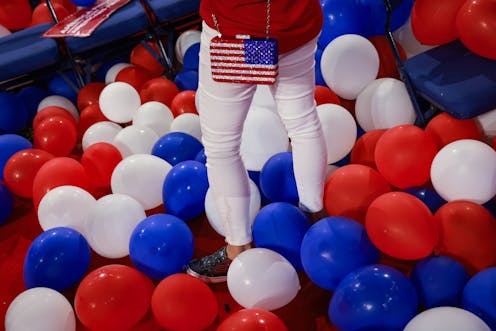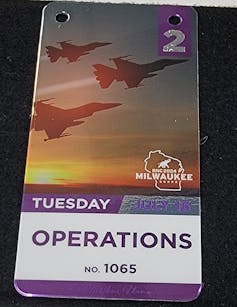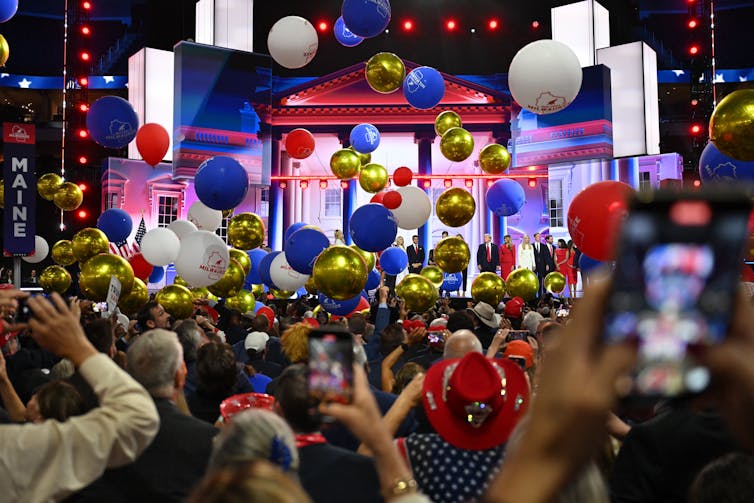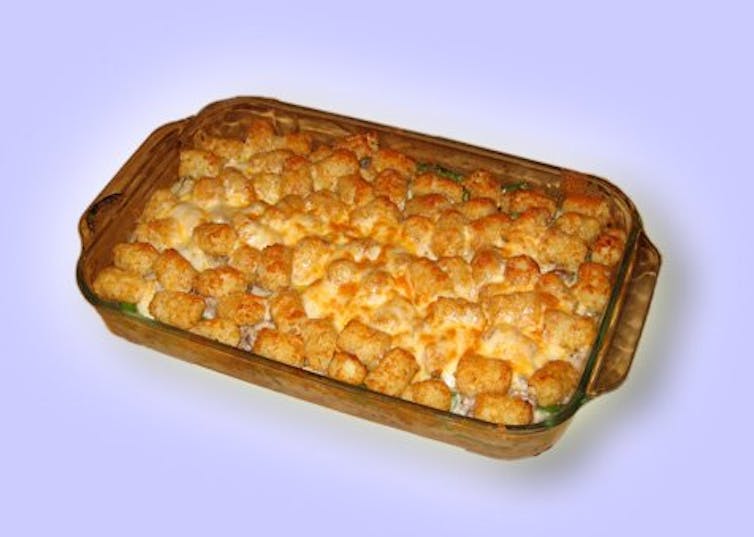Historians diving for balloons and hoping for hot dish: What Smithsonian curators will be doing at the Democratic National Convention
- Written by Claire Jerry, Political History Curator, Smithsonian Institution
 Curators from the Smithsonian were at the GOP convention in July to bring back items for the museum, including balloons.Joe Raedle/Getty Images
Curators from the Smithsonian were at the GOP convention in July to bring back items for the museum, including balloons.Joe Raedle/Getty ImagesThree political history curators from the Smithsonian’s National Museum of American History are heading to Chicago and the 2024 Democratic National Convention soon to collect stuff – or as the professionals call it, ephemera: everything from balloons to tickets to articles of clothing. The Smithsonian’s political campaign collection includes items dating back to George Washington.
Conversation politics editor Naomi Schalit spoke with Claire Jerry, Jon Grinspan and Lisa Kathleen Graddy about what curators got at the Republican National Convention in July and what they hope to snare in Chicago. All those items will be added to the collection in an effort, as Grinspan describes it, to “make sense of our moment to people wondering what we were all thinking.”
And if you’re wondering how a curator brings home balloons from a convention, they prick a small hole near the knot with the needle-sharp pin from a campaign button they’ve collected, deflate it and then pack it up. Conversation editors will be speaking again with the Smithsonian curators when they’re at the convention.
Naomi Schalit: Claire Jerry and Jon Grinspan, when we last talked, the Republican National Convention was just over and the two of you were rushing to get to the airport to head home. You didn’t necessarily know everything you were going to get.
Claire Jerry: That’s still true. We are starting to get email responses to the business cards that we handed out, but nothing has come in yet.
 A daily pass from the 2024 Republican National Convention in Milwaukee, collected by Smithsonian curators there.Claire Jerry, Smithsonian
A daily pass from the 2024 Republican National Convention in Milwaukee, collected by Smithsonian curators there.Claire Jerry, SmithsonianJon Grinspan: We’ve started working with the convention staff itself. They’ve sent us a bunch of material – signs, access badges, layout, all sorts of things from the convention, physical materials, things from the logistics and the planning. That kind of thing rhymes with stuff we have in collections from previous conventions.
Schalit: So when you say it rhymes, that’s a reference to the saying that “history doesn’t repeat itself, but it often rhymes.” I’m assuming that what these articles can do is give you a record, through these items, of how things change over the years in the organization of a convention?
Jerry: Yes. Things like maps of arenas and things like that are fairly new, but we’ve always gotten convention tickets from different conventions, and those change over time. So some of them are things that conventions have always used, and some of them are logistical things that are new in each different time period.
Schalit: How were this year’s tickets different?
Grinspan: The convention tickets this year were awfully patriotic. There’s a lot of flags, fighter jets, eagles. They really leaned into that theme.
Jerry: And they’re also plastic. Our oldest tickets, of course, are paper, and they were designed to look just like a ticket you would have gotten to anything. Whereas these tickets, many of them are designed to be put on lanyards.
Schalit: I understand you were there for the traditional balloon drop at the end of the convention. What was it like?
 Balloons fall on the last day of the 2024 Republican National Convention in Milwaukee, Wisc., on July 18, 2024.Jim Watson/AFP/Getty Images
Balloons fall on the last day of the 2024 Republican National Convention in Milwaukee, Wisc., on July 18, 2024.Jim Watson/AFP/Getty ImagesJerry: It’s amazing how quickly it blurs your vision. I was on the convention floor at that point, and I had a very clear view of the stage, where I was watching Donald Trump speak. Suddenly you can’t see the stage. You can’t see the candidates with their families up there on the stage, because there’s so many balloons.
And then you’re watching people – myself included – trying to pick balloons up off the floor, and you think you’ve got one, and then it bounces off someone’s foot, and you feel like you’re down around somebody’s knees trying to grab something off the floor. It felt a little strange, but it’s incredibly festive and celebratory and I think the presence of children, both on the platform and in the audience, gave it a real family kind of feel as well, which is not something I would necessarily have said just during the regular business part of the convention.
Schalit: Were you thinking, “I have an advanced degree in history, and I am down on my hands and knees picking up balloons from around people’s feet” to bring back to the Smithsonian?
Jerry: Literally, I was. I thought I had my hand on one, and it bounced away, and I was very close to, actually, grabbing somebody’s ankle. I was a little embarrassed. I did not have any assignment in graduate school that said, “We will now practice grabbing balloons out of the balloon drop.”
Grinspan: In 2016, I crashed into a prominent Republican politician trying to get on the floor in the middle of the balloon drop. He was very polite. It is funny, this thing where you have the advanced degree in history or research, you read the accounts of conventions from 1860 or whatever, and then at some point you are trying to climb and grab the balloons or trying to see how you can carry home all the objects you collect. There’s a real physical, material aspect of this history, and it’s our job to grab onto it.
Schalit: So all three of you are going to the Democratic convention in a few days. Lisa Kathleen, what are you thinking about as you plan that trip?
 Could Minnesota hot dish – a casserole, such as the one pictured here – be made into a convention hat?THMoore via Wikimedia Commons
Could Minnesota hot dish – a casserole, such as the one pictured here – be made into a convention hat?THMoore via Wikimedia CommonsLisa Kathleen Graddy: I am really curious to see how the language that has been used in the rallies lately manifests in material culture. Is that going to be showing up on signs? Is that showing up on buttons? Is that going to be showing up on the chyron that’s going to run around the arena?
Is something going to say, “Mind your own damn business”? Is something going to say, “We’re not going back”?
Who knows if they printed anything yet, what might be recycled that had been planned from before. And both parties always do something where they’re honoring the outgoing president. So suddenly they’re going to have to make up the Joe stuff, the “thank you Joe” materials. So is some of that going to be there that wouldn’t have been there before?
It’s going to be interesting to see what Minnesota comes up with as the delegation.
Schalit: Hot dish hats from Tim Walz’s state?
Graddy: Oh God, I’d love to see a hot dish hat. Please let there be hot dish stuff.
The authors do not work for, consult, own shares in or receive funding from any company or organization that would benefit from this article, and have disclosed no relevant affiliations beyond their academic appointment.
Authors: Claire Jerry, Political History Curator, Smithsonian Institution
